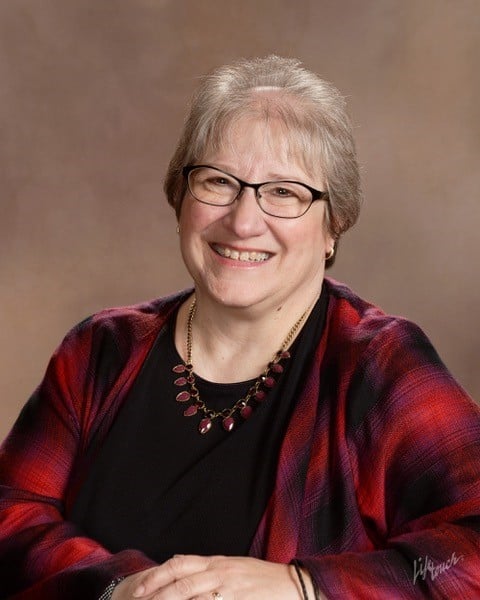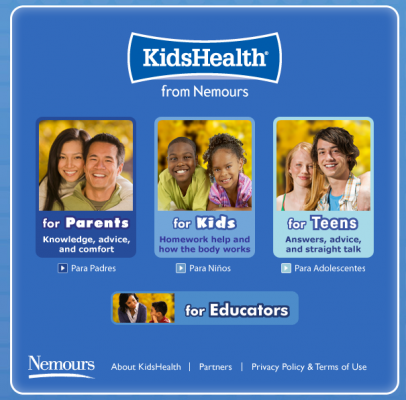Are you looking for answers to a medical or parenting question, but don’t want to go to one of those scary medical sites that finds it necessary to include every worst-case scenario? Check out KidsHealth!
I first discovered KidsHealth (www.kidshealth.org) when I was working as an elementary school counselor. Although I kept a clipping file on a variety of topics, new information was always coming out, and it was hard to keep up. In addition, the file wasn’t comprehensive; I had kept copies of articles that I found helpful or interesting, but they didn’t cover all of the topics that parents asked me about. Enter KidsHealth.
The site is split into four sections: one for parents, one for kids, one for teens and one for educators. There’s tremendous crossover among the topics, and the content, vocabulary and reading level are adjusted for each intended audience.
To give you an example of what you might find, I did a search for “chickenpox.” The first ten hits on my search included three comprehensive articles on chicken pox (one for parents, one for kids and one in Spanish), a brief piece on how chickenpox got its name (for parents), an article on sunlight and chickenpox (for parents) and one for kids on why chickenpox is itchy. This search also turned up information on shingles and smallpox -- and that was only the first page of hits.
All of the articles on KidsHealth are reviewed by physicians or mental health professionals, and an audio option allows you to listen to the article if you prefer. When the audio option is activated, an on-screen cursor moves word-by-word, making the pieces accessible for kids who might not be familiar with all of the vocabulary used in the articles.
KidsHealth includes articles on a wide variety of topics. Users can navigate the site by using the search box or by clicking on one of the subject tabs on the homepage, which vary by audience.
Topics on the homepage for parents include general health, growth and development, diseases, pregnancy and baby, nutrition and fitness, emotions and behavior, school and family life and recipes.
Teen page topics include body, mind, food & fitness, school & jobs and drugs & alcohol while the kids page tabs cover how the body works, puberty and growing up, staying healthy, staying safe and people, places & things that help, along with quizzes and a kids’ medical dictionary.
Each home page also includes a Q & A tab. Clicking on this tab brings up a new list of topics. There’s overlap with the topics on the main page, but additional subjects show up here as well, and clicking on them will take you to a brief question and answer on the topic you’ve selected.
KidsHealth is a wealth of information. Since it’s intended for a general audience, however, I wouldn’t recommend sending your kids there unsupervised. While most subjects on the kids’ page are G-rated, there may be topics there that you’d prefer to talk to your child about yourself, rather than having them read about them online. (The kids section is a great place for parents to find information on touchy topics written in kid-friendly verbiage, however.)
And, while the sexual health section for teens reports, “The most effective way to prevent pregnancy and STDs is abstinence,” the site also includes information on contraception and other topics that do not necessarily reflect the values of Catholic families.
KidsHealth is reportorial and non-judgmental in tone, and provides a great deal of valuable information. But, as with anything else intended for a general audience, we as parents must review the material ourselves before deciding if, when and how to share it with our children. KidsHealth bills itself as family friendly, and while it provides excellent information, it does not purport to be a substitute for parental discussion.
As a counselor, I frequently used this site to provide information to parents, I sometimes printed out articles to use as a resources with my students, and I sometimes read and absorbed the information myself, then passed it along to whomever was asking the question. Because the information is vetted by medical and mental health professionals, I trust the site as a resource for my questions -- one that doesn’t find it necessary to take a melodramatic approach to topics that can already emotionally-loaded.
Copyright 2013 Lisa Hess
About the Author

Lisa Hess
Transplanted Jersey girl Lisa Lawmaster Hess is the author of a blog compilation, three novels, and three non-fiction books, including the award-winning Know Thyself: The Imperfectionist’s Guide to Sorting Your Stuff. A retired elementary school counselor, Lisa is an adjunct professor of psychology at York College of Pennsylvania. She blogs at The Porch Swing Chronicles, Organizing by STYLE, and here at Catholicmom.com. Read all articles by Lisa Hess.




.png?width=1806&height=731&name=CatholicMom_hcfm_logo1_pos_871c_2728c%20(002).png)
Comments